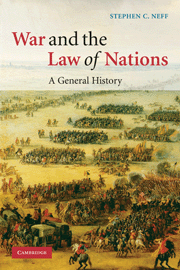Conclusion
Published online by Cambridge University Press: 30 July 2009
Summary
Our journey has been a long one – from the age of the chariot and the hoplite to that of the hydrogen bomb and the cruise missile. It may be wondered whether there can be said to have been any kind of unified theme or thread to the story. In this light, some might be inclined to look for a progressivist theme – a relatively stately progression from ignorance to wisdom, from evil to good, from passion to reason, from selfishness to altruism, from darkness to light. Those searching for such a tale will have read the preceding pages with dismay. It is not easy to say whether fundamental ideas about war are today significantly more advanced than they were in the age of Cicero. It may even be contended that the post-1945 version of just-war doctrine is greatly inferior to that of the ancient stoics and the medieval Christians, in that it has no deep grounding in a rich body of ideas about the conduct of human social and political relations in general, in the manner of ancient and medieval natural law.
A more sophisticated variant of the progressivist theme might see in this history a slightly different grand theme: one of fall and redemption. On this view, there was an early state of grace or (in more secular terminology) of enlightenment, from which humankind tragically strayed, but to which it eventually returned.
- Type
- Chapter
- Information
- War and the Law of NationsA General History, pp. 395 - 398Publisher: Cambridge University PressPrint publication year: 2005



